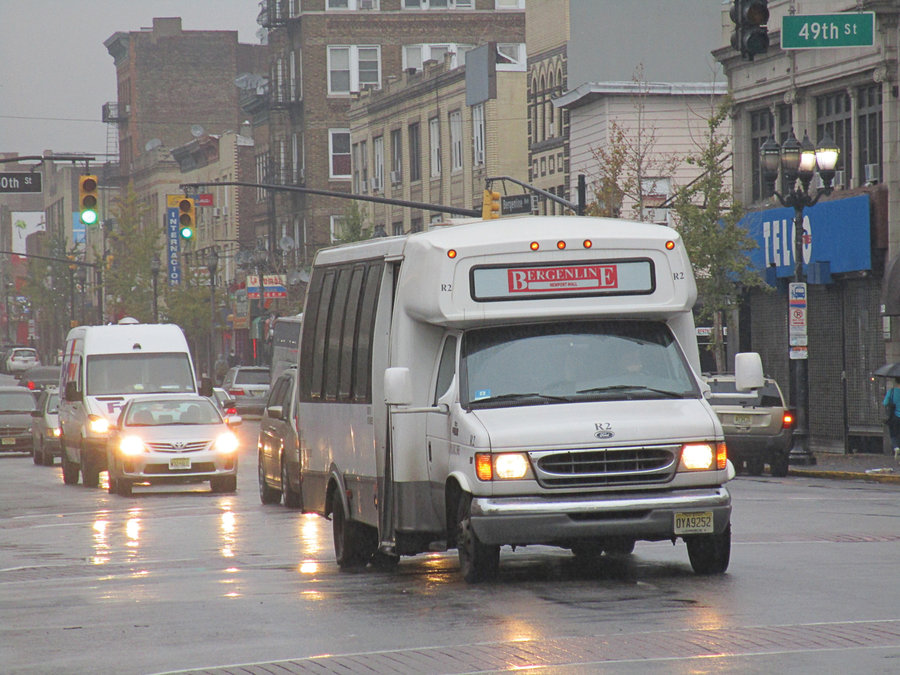The death of 11-year George Gonzalez, struck by a jitney bus on Kennedy Boulevard near Neptune Avenue on Oct. 14, may prompt a review of regulations that apply to the vehicles. But right now, if a police officer sees a jitney bus operating and suspects a potential violation with the van – suspended license for the driver, no insurance, or other problems – the cop’s hands are legally tied.
“We just can’t do it,” one Jersey City cop said. “And it’s frustrating. Because we know there is a problem. But we don’t have jurisdiction.”
Gonzalez was walking to school when he was struck. He was rushed to Jersey City Medical Center and later died.
The bus driver, Raul Delatorre-Galaza, has been charged with causing a death while driving on a suspended license, city officials said, and was found to have a number of past serious driving charges.
Even Hudson County officials can’t intervene if they suspect a vehicle is being operated unsafely or has safety violations in its equipment, despite its Weights and Measures division’s legal authority to pull over truck traffic.
“I am working on legislation. I’m told by lawyers that it won’t be easy.” — Nicholas Chiaravalloti,
____________
The state’s ability to check on some buses is also limited, according to former Assemblyman Jason O’Donnell.
Some of the jitneys that run from the foot of the Bayonne Bridge to New York City are covered under federal interstate laws, and so it would take a federal authority to oversee any street side inspection.
Commuters throughout the county sometimes prefer to save time and money by skipping NJ Transit’s buses and taking the smaller, independent jitney vans that run to New York City and Journal Square.
Local cops have hands tied by federal regulations
Law enforcement officials believe there are many more infractions that are not discovered until after a tragedy occurs. A jitney similar to the one that killed Gonzalez was reportedly pulled over for a moving violation across the street from the boy’s wake on Oct. 19 and found to have a number of similar violations.
A similar death in West New York in 2013 prompted outrage, yet the response was limited because the jitneys that go from Jersey to New York fall under federal laws that apply to taxis and limos. They are regulated by the Federal Motor Carrier Safety Administration, under regulations that govern omni buses. Official say anything that goes interstate is considered an omni bus.
Technically, the state police can pull these vans over because they have the authority to operate on behalf of the federal agency. But these troopers rarely operate in Hudson County except along state roads such as the New Jersey Turnpike, and rarely if at all do enforcement on streets like Kennedy Boulevard.
Officials seeking answers
Rep. Albio Sires said last week he intends to meet with local and state legislators to establish some kind of enforcement mechanism to catch problems with the jitneys before there are more tragedies. He said local police should have more jurisdiction over these busses.
O’Dea said he and Jersey City Mayor Steven Fulop would welcome a conversation that would allow the county and local governments to be able to monitor and deal with such buses.
Inspections do take place from time to time, when local law enforcement agencies partner with the state Department of Motor Vehicles. In Bayonne and North Bergen, jitneys have gotten summonses and paid fines, but are soon back on the road, often with safety violations that include bad brakes and exit doors welded shut.
In an surprise inspection done by the Hudson County Prosecutor’s Office in 2014, some 23 out of 33 jitneys were found to be unsafe and were taken out of service.
Assemblyman Nicholas Chiaravalloti, whose legislative district covers the area where the death in Jersey City occurred, is also trying to get something done.
“I am working on legislation. Pretty complicated because of Title 38 and Interstate Commerce,” he said. “I hope to have a bill ready by next Thursday. I’m told by lawyers that it won’t be easy.”
According to the state Motor Vehicle Commission (MVC) as of a year ago, 6,500 jitney buses are registered in New Jersey.
In order to own and/or drive a jitney, operators need several qualifications. Depending on whether the jitney seats up to 15 or up to 30 passengers, the driver needs to have a class B or class C Commercial Drivers License (CDL). Their vehicle must also have an “Omnibus” license plate, which means they have registered the vehicle with the federal government. According to the MVC, under New Jersey guidelines, these buses must be inspected on their “company property” twice a year, which is done by the state MVC mobile inspection team.
Residents on the west side of Jersey City where the death of the 11-year-old occur have complained for years, not just about jitneys but also about speeding and other unsafe conditions. Numerous residents have complained about erratic driving, extended idling, and unpredictable routes.
Al Sullivan may be reached at asullivan@hudsonreporter.com.
